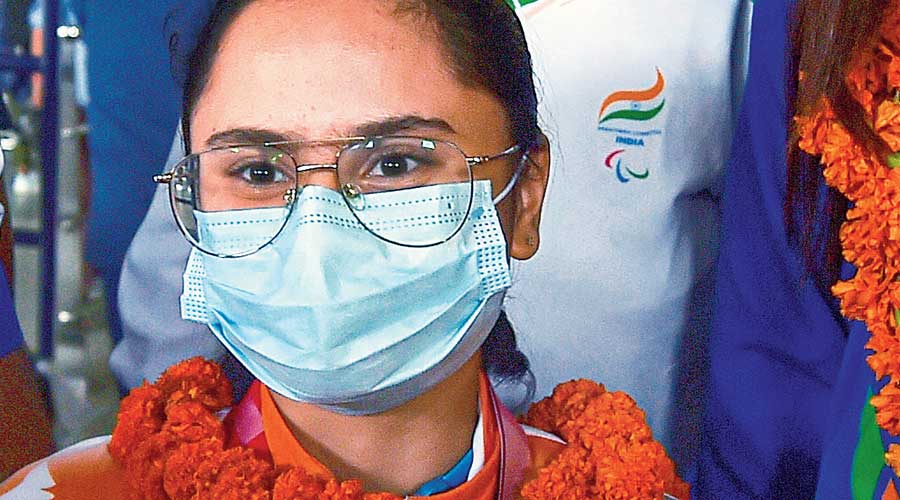The Tokyo Paralympic Games will be remembered as the coming of age of the Indian Para-athletic movement. An unprecedented 19 medals, including five gold, have raised the stock of the Paralympians and now people are looking at para-athletes from a different perspective.
“Yes, the outlook has changed. For example I had gone to my first Paralympic Games (Athens 2004) spending money from my own pocket. People hardly knew about Para-athletics. And from there to think of it the government support, corporate backing… para-athletics has come a long way,” javelin medallist Devendra Jhajharia told The Telegraph from Jaipur on Monday. Jhajharia won a silver medal in the javelin throw F46 event in Tokyo to add to his gold medals in the Rio Games (2016) and Athens (2004).
Of the nine events India competed in at Tokyo, four (athletics, powerlifting, shooting and swimming) are run by the Paralympic Committee of India (PCI) while the other five (archery, badminton, canoeing, table tennis and taekwondo) are under the aegis of the respective national sports federations.
“One of the reasons behind this success is meticulous planning. Whatever the athletes asked for was provided by us. Be it training abroad, or requirements for a nutritionist or a physio, the athletes did not have to wait. People are waking up to para-athletes now but we know this success is the result of the hard work that everyone put in since 2016,” PCI secretary Gursharan Singh said from Tokyo.
The government, in the last Olympic cycle (2016-21), spent a total of Rs 1,169.65 crore on able and para-athletes. Of this, only Rs 27.70 crore, or 2.37 per cent, has been spent on para-athletes since 2015, the year they came under the Target Olympic Podium Scheme (TOPS). Of this amount, around Rs 11 crore has been part of TOPS while the rest has been on the annual calendar for training and competitions (ACTC).
Singh hopes that after the rich medal haul, the funds will increase. “We are aiming to participate in more events in the Paris Paralympic Games in 2024. The target is to increase the number of disciplines from nine to at least 15. Without financial support it will not be possible,” Singh said.
Jhajharia reasoned that since foreign tours were minimal owing to Covid-19 restrictions, the money spent was less. “Whatever we have achieved it’s because of complete synergy between all the stakeholders. The sports ministry, Sports Authority of India (SAI) and the PCI worked in tandem. What can the government do if the pandemic forces you to stay indoors?”
Jhajharia also lauded the efforts of Olympic Gold Quest, JSW Sports and GoSports Foundation. “They play a huge role in supporting various athletes.”
Bangalore-based Go Sports Foundation, a non-profit organisation, backs 43 para-athletes and of them, 21 were in the Indian contingent. Seven, including shooter Avani Lekhara, won eight medals.
“Financial support and advanced training are very important to perform at the highest level,” felt Debasish Das, father of 17-year-old para-shooter Ankur.
The Calcutta para-shooter, who had won the Nationals in 2019, could not qualify for the Tokyo Olympics owing to the lockdown. He has been roped in by Olympic Gold Quest and will be in Hyderabad for the next seven months honing his shooting skills under foreign coaches at the Gagan Narang’s Gun For Glory Shooting Academy. Ankur is seen as a medal prospect in the Paris Games.
“The best part is we have so many youngsters coming up. Avani is just 19. We have a good talent pool,” Singh said.
The next year is packed for the para-athletes with the Commonwealth Games, World Para Athletics Championships and the Asian Para Games.
“We should set small goals in each of these tournaments. And make the giant leap in the 2024 Paris Games,” Jhajharia said.
The coaching part also is something everyone needs to look at. PCI president Deepa Malik, in one of her news conferences in Tokyo, had spoken about educating the coaches.
Agrees Chandra Sekhar, whose pupil Avani bagged two medals (gold and bronze). “To take the Tokyo success forward the coaches have to be educated. The grassroots, advanced and high performance coaches will have to work together.
“There has to be a scientific approach. There is also a lot of insecurity among coaches if someone else’s student wins a medal. That also pegs us back. Coaches need to work hard,” Shekhar said from Jaipur.










